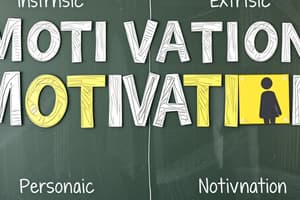Podcast
Questions and Answers
What is motivation?
What is motivation?
- The wants or needs that direct behavior toward a goal (correct)
- Emotional state of being
- A type of eating disorder
- The absence of hunger
Name the two types of motivation.
Name the two types of motivation.
Intrinsic and Extrinsic
Intrinsic motivation is performed to receive something from others.
Intrinsic motivation is performed to receive something from others.
False (B)
Who proposed that 'behavior is instinct-driven' to aid survival?
Who proposed that 'behavior is instinct-driven' to aid survival?
Define instinct.
Define instinct.
What does the Drive Theory of Motivation suggest?
What does the Drive Theory of Motivation suggest?
Explain the Optimal Arousal/Yerkes-Dodson Law.
Explain the Optimal Arousal/Yerkes-Dodson Law.
What is self-efficacy?
What is self-efficacy?
What signals satiation and is released by fat cells?
What signals satiation and is released by fat cells?
Define BMI.
Define BMI.
What is Bulimia Nervosa characterized by?
What is Bulimia Nervosa characterized by?
What is Anorexia Nervosa?
What is Anorexia Nervosa?
Who was the first to engage in large-scale human sex research surveys?
Who was the first to engage in large-scale human sex research surveys?
What does Sexual Orientation refer to?
What does Sexual Orientation refer to?
Define Gender Identity.
Define Gender Identity.
Gender Dysphoria occurs when an individual is comfortable identifying with their biological gender.
Gender Dysphoria occurs when an individual is comfortable identifying with their biological gender.
What are the three components of emotion?
What are the three components of emotion?
What does the James-Lange Theory of Emotion propose?
What does the James-Lange Theory of Emotion propose?
According to the Cannon-Bard Theory of Emotion, what occurs simultaneously?
According to the Cannon-Bard Theory of Emotion, what occurs simultaneously?
What does the Schachter-Singer Two-Factor Theory of Emotion consist of?
What does the Schachter-Singer Two-Factor Theory of Emotion consist of?
What does Lazarus' Cognitive-Mediational Theory state?
What does Lazarus' Cognitive-Mediational Theory state?
Flashcards
Motivation
Motivation
The wants or needs that drive behavior towards specific goals.
Intrinsic Motivation
Intrinsic Motivation
Actions taken for personal satisfaction, driven by internal feelings.
Extrinsic Motivation
Extrinsic Motivation
Actions taken to obtain rewards from others, driven by external factors.
Instinct
Instinct
Signup and view all the flashcards
Drive Theory of Motivation
Drive Theory of Motivation
Signup and view all the flashcards
Optimal Arousal/Yerkes-Dodson Law
Optimal Arousal/Yerkes-Dodson Law
Signup and view all the flashcards
Self-Efficacy
Self-Efficacy
Signup and view all the flashcards
Satiation
Satiation
Signup and view all the flashcards
Metabolic Rate
Metabolic Rate
Signup and view all the flashcards
Set-point Theory
Set-point Theory
Signup and view all the flashcards
Prader-Willi Syndrome (PWS)
Prader-Willi Syndrome (PWS)
Signup and view all the flashcards
Eating Disorders
Eating Disorders
Signup and view all the flashcards
Bulimia Nervosa
Bulimia Nervosa
Signup and view all the flashcards
Binge Eating Disorder
Binge Eating Disorder
Signup and view all the flashcards
Anorexia Nervosa
Anorexia Nervosa
Signup and view all the flashcards
Alfred Kinsey
Alfred Kinsey
Signup and view all the flashcards
Masters and Johnson
Masters and Johnson
Signup and view all the flashcards
Sexual Orientation
Sexual Orientation
Signup and view all the flashcards
Gender Identity
Gender Identity
Signup and view all the flashcards
Gender Dysphoria
Gender Dysphoria
Signup and view all the flashcards
Emotion
Emotion
Signup and view all the flashcards
Mood
Mood
Signup and view all the flashcards
Study Notes
Motivation
- Defined as the wants or needs that drive behavior towards specific goals.
- Two main types: intrinsic (internal satisfaction) and extrinsic (external rewards).
Types of Motivation
- Intrinsic Motivation: Actions taken for personal satisfaction.
- Extrinsic Motivation: Actions taken to obtain rewards from others.
Theoretical Perspectives
- William James: Suggested behavior is instinct-driven for survival.
- Instinct: Refers to biologically-driven, species-specific behaviors that are not learned.
- Drive Theory of Motivation: Proposes motivation stems from the need to maintain homeostasis.
- Optimal Arousal/Yerkes-Dodson Law: Motivation is influenced by the need to achieve an optimal level of arousal.
Arousal Levels
- Low Arousal: Associated with boredom.
- High Arousal: Can lead to anxiety.
Self-Efficacy
- Defined as the belief in one's capabilities to execute tasks.
- Albert Bandura: Introduced the concept of self-efficacy as a source of motivation.
Hunger and Satiety
- Satiation: Absence of hunger, signaled by leptin (a hormone released by fat cells).
- Metabolic Rate: Refers to the energy expended over time.
- Set-point Theory: Hypothesis that individuals have a specific weight range they naturally maintain.
Eating Disorders
- Prader-Willi Syndrome (PWS): Genetic disorder characterized by intense hunger and low metabolism.
- Eating Disorders: Include abnormal eating behaviors, with types such as:
- Bulimia Nervosa: Binge eating followed by purging.
- Binge Eating Disorder: Regularly consuming excessive amounts of food.
- Anorexia Nervosa: Maintaining significantly low body weight through starvation or excessive exercise.
Human Sexuality Research
- Alfred Kinsey: First to conduct extensive human sexual behavior research, challenging misconceptions of female sexuality.
- Masters and Johnson: Conducted research that involved direct observation of sexual activities with physiological measurements.
Sexual Orientation and Gender Identity
- Sexual Orientation: Emotional and erotic attraction to others.
- Gender Identity: Personal sense of being male or female; does not always correspond to biological sex.
- Gender Dysphoria: Discomfort with one’s biological sex, leading to a desire to live according to one’s gender identity; requires a significant duration and distress for diagnosis.
Emotion
- Defined as a subjective state often described in feelings.
- Mood: A longer, less intense emotional state not directly tied to specific experiences.
Theories of Emotion
- James-Lange Theory: Emotions result from physiological responses; the emotional experience follows the body's response.
- Cannon-Bard Theory: Proposes simultaneous emotional experience and physiological arousal.
- Schachter-Singer Two-Factor Theory: Emotions arise from physiological arousal interpreted through a cognitive lens based on context.
- Lazarus' Cognitive-Mediational Theory: Holds that emotions are determined by the appraisal of stimuli.
Studying That Suits You
Use AI to generate personalized quizzes and flashcards to suit your learning preferences.



